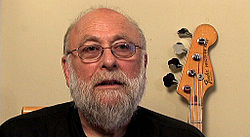Harvey Brooks (bassist)
| Harvey Goldstein Brooks | |
|---|---|
 |
|
| Background information | |
| Birth name | Harvey Goldstein |
| Born |
July 4, 1944 Manhattan, New York, U.S. |
| Genres | Blues rock, jazz fusion, R&B, psychedelic rock, folk rock, pop |
| Occupation(s) | Musician, composer, producer |
| Instruments | Electric bass |
| Years active | 1960s–present |
| Labels | Elektra, Columbia, Vanguard, Verve |
| Associated acts | Bob Dylan, Clarence Clemons and the Red Bank Rockers, Miles Davis, The Doors, Electric Flag, Richie Havens, Seals & Crofts, Fontella Bass, Cass Elliott, Al Kooper, Fabulous Rhinestones, The New York Rock and Soul Revue |
Harvey Brooks (born Harvey Goldstein; July 4, 1944 in Manhattan, New York) is an American bassist .
Brooks came out of a New York music scene that was crackling with activity in the early 1960s. One of the younger players on his instrument, he was a contemporary of Felix Pappalardi and Andy Kulberg and other eclectic bass players in their late teens and early 20s, who saw a way to bridge the styles of folk, blues, rock, and jazz.
Al Kooper gave Brooks his first boost to fame when he asked him to play as part of Bob Dylan's backing band on the sessions that yielded the album Highway 61 Revisited (1965) — in contrast to the kind of folkie-electric sound generated by the band on his previous album, Bringing It All Back Home (1965). Producer Bob Johnson and Dylan were looking for a harder, in-your-face electric sound, and Brooks, along with guitarist Michael Bloomfield and organist Al Kooper, provided exactly what was needed on one of the most famous recordings of the 1960s. Brooks was also part of Dylan's early backing band which performed to great notoriety at Forest Hills, Queens and the Hollywood Bowl in 1965. This band also included Robbie Robertson (guitar), Al Kooper (keyboards) and Levon Helm (drums).
From the Dylan single and album, which became two of the most widely heard (and, at the time, most controversial) records of the 1960s, Brooks branched out in a multitude of directions, as he went on to play on records by folk artists like Eric Andersen at Vanguard Records, Richie Havens and Jim & Jean at Verve Records, transitional electric folk-rockers such as David Blue (whose producer was looking for a sound similar to that on Highway 61 Revisited), and various blues-rock fusion projects involving Bloomfield and Kooper.
...
Wikipedia
